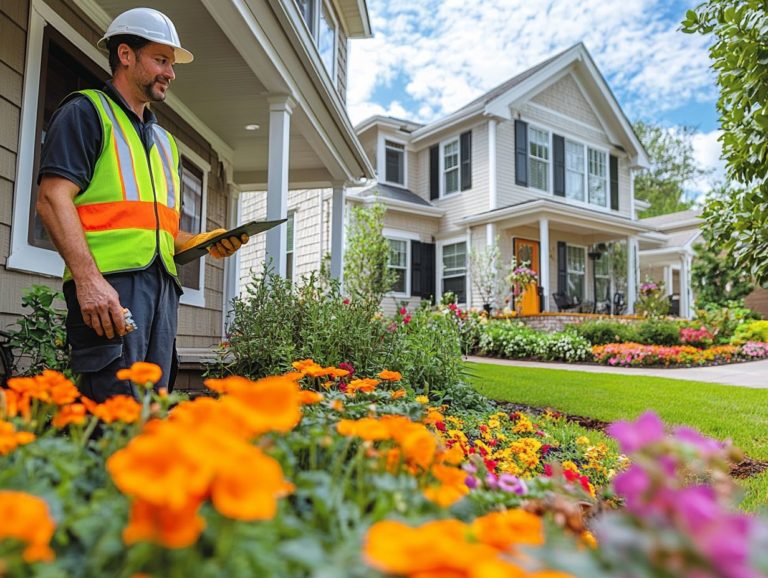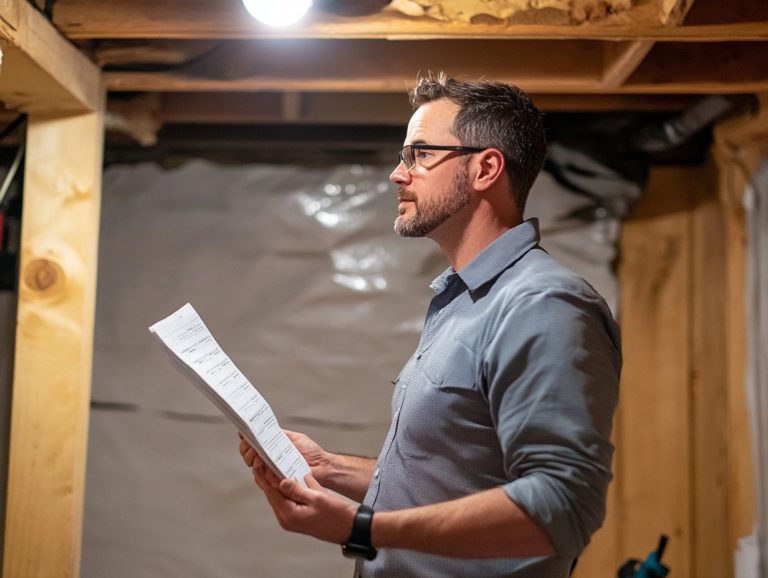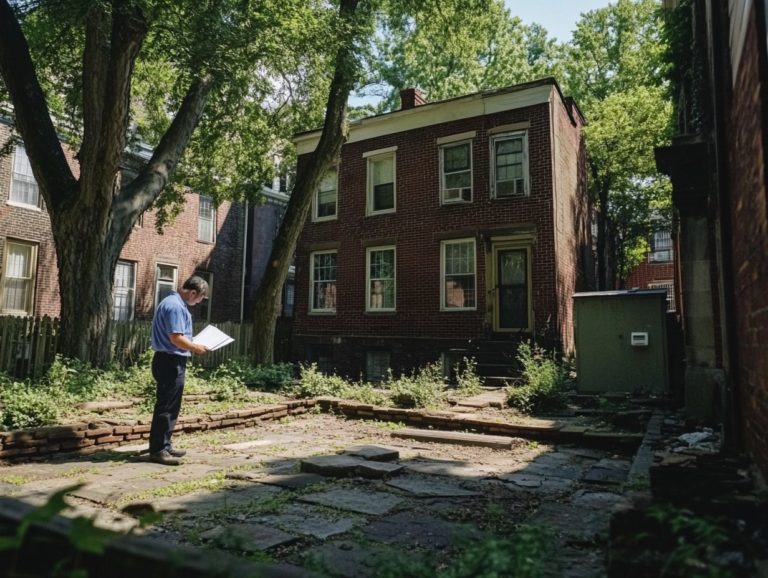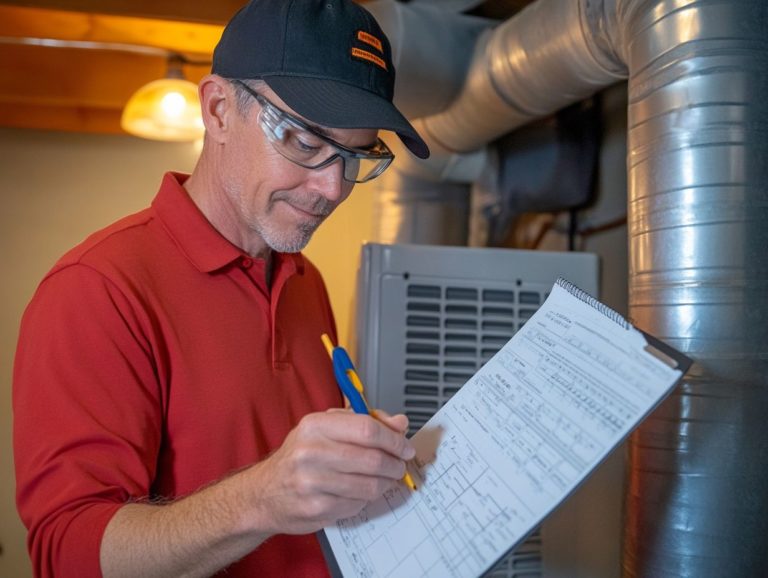Understanding Home Inspection Fees
When you’re buying or selling a home, grasping the costs involved is essential. Home inspection fees are a significant part of that calculation.
This article delves into what home inspection fees encompass, including their purpose and the factors that influence these costs. You ll find insights on typical fee ranges for various property types, what services are included, and tips on selecting a qualified home inspector.
Whether you’re a first-time buyer or a seasoned seller, understanding these fees will empower you to make informed decisions on your real estate journey.
Contents
Key Takeaways:
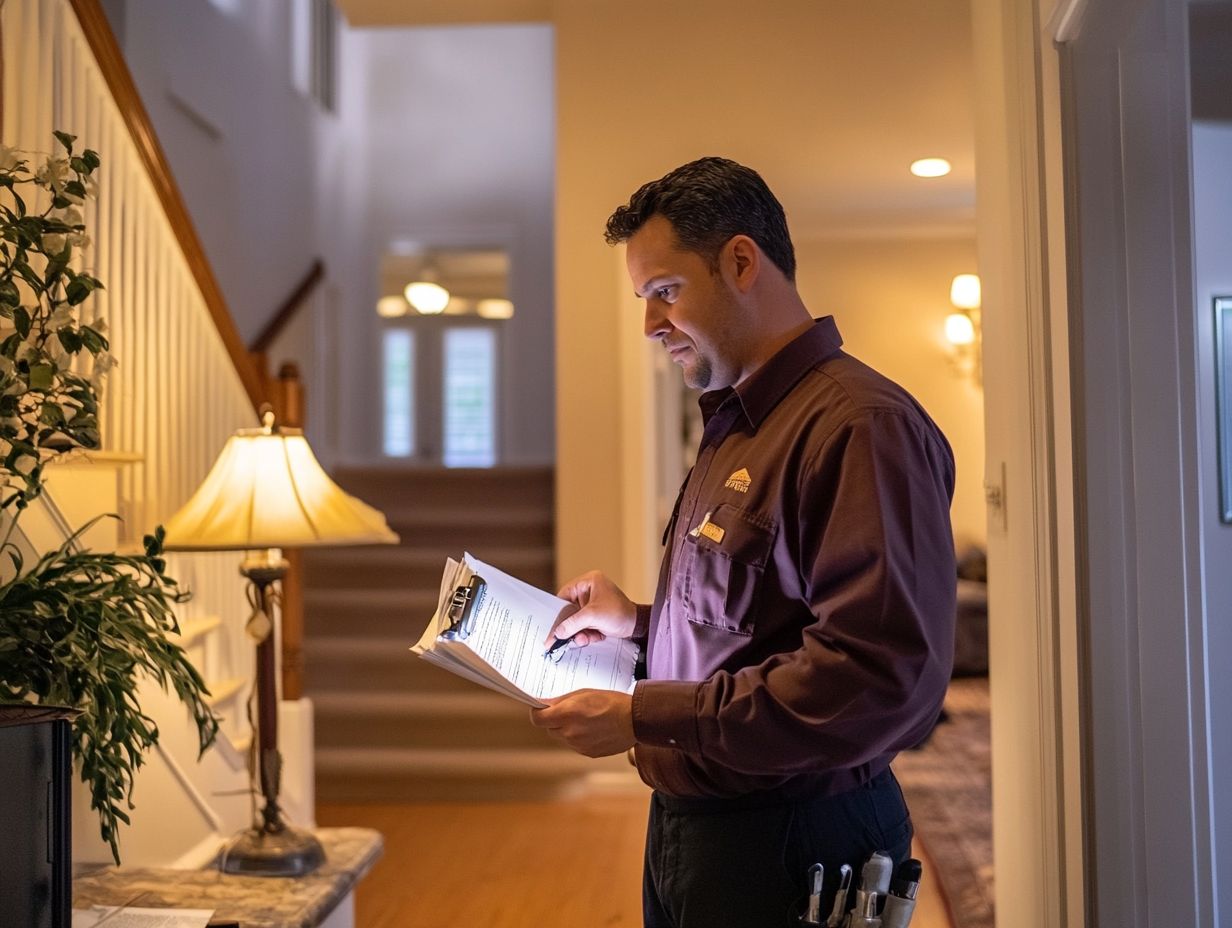
- Home inspection fees vary based on factors such as property size, location, and additional services offered.
- Thoroughly research and compare home inspectors before hiring to ensure you get the best value for your money.
- A home inspection fee typically includes standard services and reports, but additional services may come at an extra cost.
What is a Home Inspection Fee?
A home inspection fee is an essential investment in the process of buying or selling a property. It covers a range of evaluations conducted during a professional home inspection. This typically includes examining structural integrity, heating and cooling systems, plumbing, and electrical systems. Inspectors also perform an in-depth review of any hidden issues that could impact the overall experience.
This fee can vary widely based on several factors, including the home’s age, size, and location. It’s crucial for buyers and sellers to understand the elements that drive these costs.
Factors Affecting Home Inspection Fees
Several factors significantly influence home inspection fees. Pricing methods, whether a flat rate or location-based pricing, along with the size and age of the home, are critical in determining the final cost. For a deeper insight, check out our article on understanding the cost breakdown of home inspections.
Size and Age of Property
The size and age of a property play a pivotal role in determining home inspection fees. Larger homes generally require more time for a thorough inspection. Older homes might present unique challenges that call for a more detailed evaluation.
For example, a sprawling estate with multiple bedrooms and extensive outdoor areas needs a detailed look at many systems, from plumbing to electrical wiring. Inspectors could easily spend hours inspecting every corner, which often results in a higher inspection fee.
On the other hand, an older home built in the early 1900s might have outdated materials, such as knob-and-tube wiring or deteriorating foundations. These factors complicate the inspection process and can lead to unexpected costs for potential repairs.
Location and Market Demand
Location significantly influences home inspection fees. Properties in desirable areas often command higher prices due to increased market demand and competitive pricing strategies by inspection services.
In thriving housing markets, inspection businesses see a surge in demand, allowing them to adjust their fees accordingly. Knowing local market trends can help you save money. For instance, neighborhoods with well-established amenities tend to attract more homebuyers, driving up inspection costs.
Conducting comprehensive market research enables inspectors to compare rates with similar services, ensuring their prices remain competitive. This strategic pricing impacts consumer choices and reflects the quality and reliability of the services offered, shaping perceptions of the inspection industry as a whole.
Don t wait! Understand these fees now to make smarter real estate decisions.
For further information, consider consulting a home inspector or learning more about the home buying or selling process.
Additional Services and Add-ons
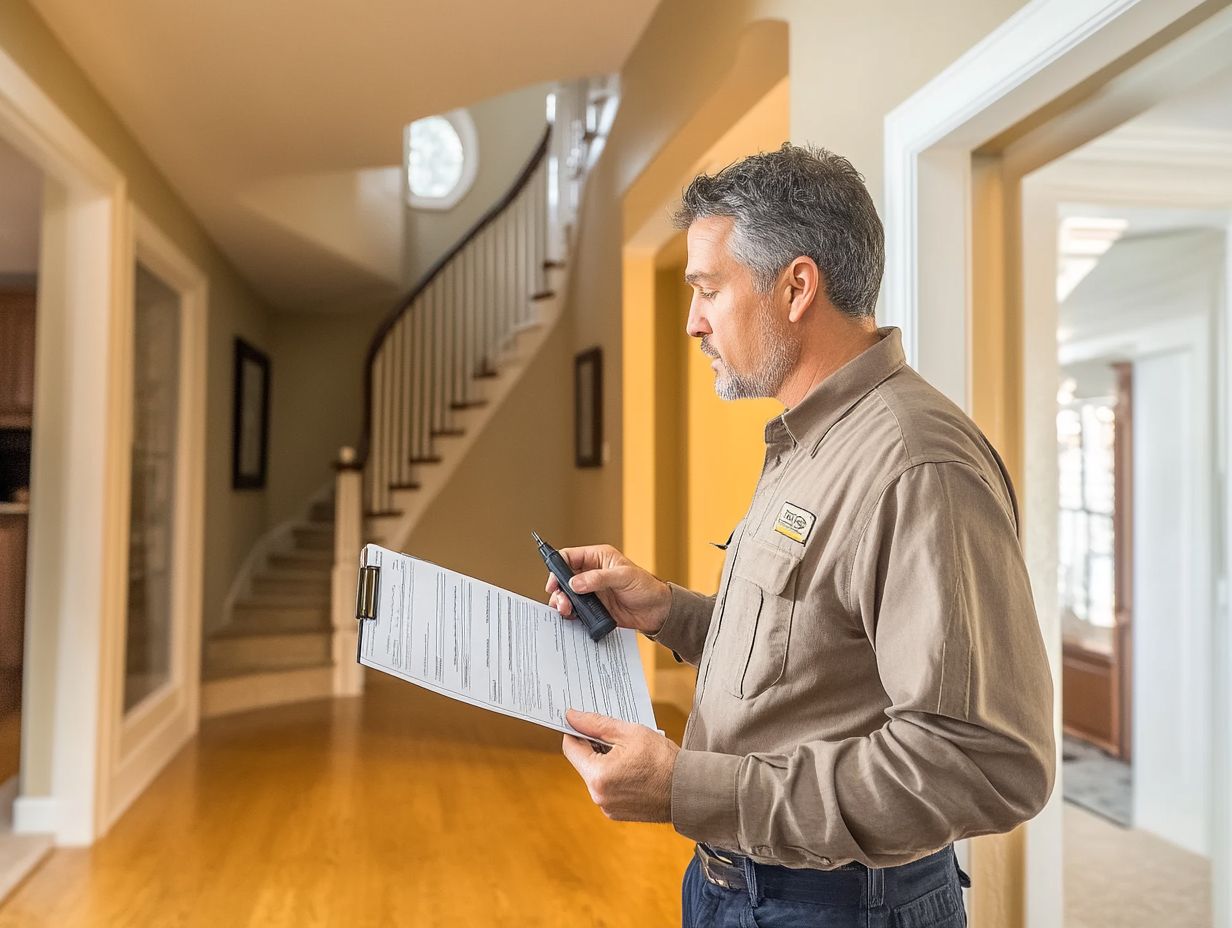
Home inspection fees can increase when you choose additional services and add-ons like radon testing, termite inspections, or a detailed assessment of specific systems such as heating, ventilation, and air conditioning (HVAC) and plumbing.
These extra examinations not only elevate the thoroughness of your home assessment but also offer invaluable insights into potential issues that could arise down the road.
For example, radon testing is crucial in areas where radon levels are known to be high, as this colorless gas can pose serious health risks. Likewise, a termite inspection can save you from expensive repairs later if any wood damage is detected early on.
Common add-ons like mold inspections and pool safety checks are becoming increasingly popular as homeowners aim for comprehensive assessments that ensure both safety and longevity.
While these additional services may raise your overall costs, they often lead to substantial savings by pinpointing potential problems before they escalate.
Typical Home Inspection Fees
Home inspection fees can fluctuate significantly, influenced by various factors such as the pricing strategies used by inspectors, the competitive landscape of your local market, and the specific details in the home inspection report.
On average, you’ll likely find costs starting at a few hundred dollars to well over a thousand, depending on your unique circumstances.
Range of Fees for Different Types of Properties
The fees for home inspections can vary significantly depending on the property type. Larger homes or those needing specialized inspections often come with higher costs, reflecting competitive pricing and unique evaluation methods.
For single-family homes, you ll typically find them nestled in a moderate price range, which makes sense given their popularity and accessibility. On the flip side, condos can be a more budget-friendly option, especially appealing to first-time buyers. However, their fees can fluctuate based on amenities and shared facilities.
Regarding commercial properties, be prepared for premium pricing, particularly influenced by location and size. A well-maintained, larger space equipped with modern systems may lead to higher inspection costs, while smaller, older commercial buildings might present challenges that affect their fee structures.
Ultimately, grasping how property size, condition, and type intertwine with inspection costs is essential for anyone considering a purchase.
What is Included in a Home Inspection Fee?
A home inspection fee usually includes a broad array of services, providing you with a detailed inspection report that meticulously outlines the condition of various systems and structures within your home.
This encompasses both standard services and any additional options you may choose as a homeowner.
Standard Services and Reports
Standard services included in a home inspection typically encompass a thorough evaluation of critical systems like HVAC, plumbing, and electrical systems, ultimately resulting in a detailed inspection report that highlights any concerns or necessary repairs.
This assessment is an invaluable resource for you as a prospective homeowner or buyer, offering a clear understanding of the property’s overall condition.
During the inspection, vital structures such as the roof, foundation, and insulation are also scrutinized to uncover potential issues that might impact safety or comfort.
The inspector s findings are meticulously documented in a report that not only outlines the identified problems but also offers insights into routine maintenance tips and preventive measures.
This transparency is essential for you to make informed decisions about your investment, helping you avoid any unexpected costs in the future.
Don t wait to discover potential issues schedule your inspection today!
Optional Services and Add-ons
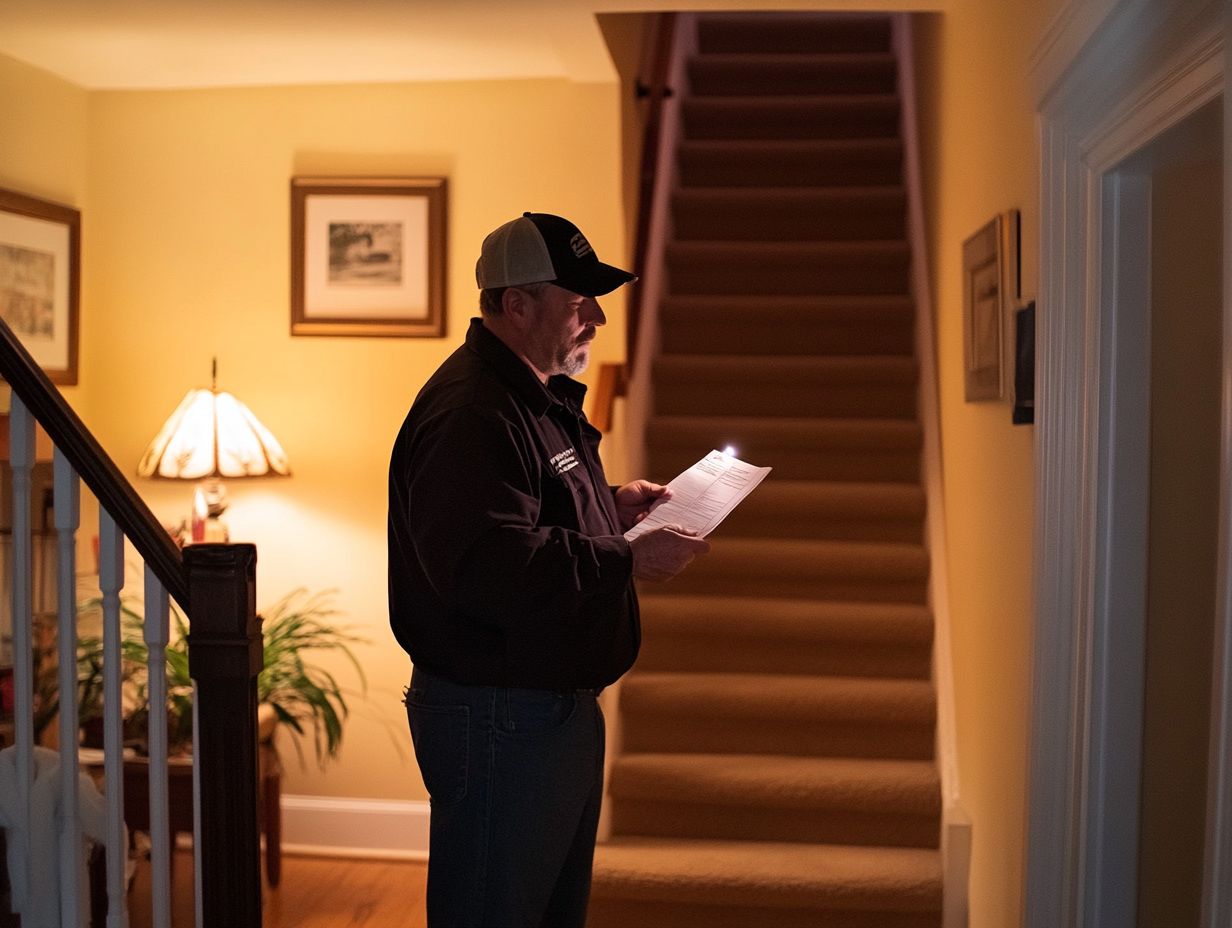
Optional services and add-ons, such as radon testing, termite inspection, and thermal imaging, can significantly enhance the thoroughness of a home inspection. However, they may also increase the overall fee.
These additional inspections delve deeper into potential issues that a standard assessment might overlook. They provide you with invaluable insights as a prospective homeowner.
For instance, radon testing is essential in areas prone to elevated levels of this odorless gas, which can severely affect indoor air quality and safety. Likewise, a termite inspection acts as a protective measure against costly infestations that could compromise the structural integrity of the home.
While these services may add a few hundred dollars to your inspection cost, the peace of mind and protection they provide can far outweigh the expense. Being equipped with this knowledge is crucial for making informed decisions.
Don t miss out on these essential inspections!
How to Choose a Home Inspector
Selecting a qualified home inspector is an important step in your home buying or selling journey. The right inspector can elevate your experience and deliver a thorough inspection report that truly reflects the property’s condition.
It s crucial to evaluate their credentials, experience, and any affiliations with reputable organizations such as the American Society of Home Inspectors or InterNACHI. Making this thoughtful choice can significantly impact your peace of mind throughout the process.
What to Look for in a Qualified Inspector
When selecting a qualified home inspector, seek out certifications and memberships with reputable organizations like the American Society of Home Inspectors (ASHI) or InterNACHI. These affiliations are strong indicators of professionalism and expertise that you can trust.
These organizations maintain rigorous standards to ensure that their members are well-trained and knowledgeable about the latest building codes and inspection techniques. A qualified home inspector will typically hold relevant qualifications, such as a state license or specialized training, which further bolster their credibility.
By choosing an inspector affiliated with such professional bodies, you can feel more secure in your decision. You ll know that your inspector is dedicated to staying current in the field and adhering to best practices.
This not only protects your investment but also offers you peace of mind throughout the buying or selling process.
Questions to Ask Before Hiring
Before you hire a home inspector, it’s essential to ask specific questions about their experience, the inspection process, and what the final inspection report will include. Asking these questions will boost your overall experience!
First, inquiring about the inspector’s years of experience in the field will shed light on their expertise and reliability. You ll want someone who knows their stuff.
Also, ask about the range of services offered. Does the inspection include specialized evaluations for mold, pests, or other environmental hazards? It s worth knowing what you re getting into.
Make sure to discuss the format and details of the inspection report. A comprehensive, well-structured report can provide invaluable insights, making it much easier for you to understand any potential issues with the property.
By asking these critical questions, you can ensure you select a qualified inspector who aligns with your needs. This paves the way for a smooth and informed home-buying process.
Frequently Asked Questions
What are home inspection fees?
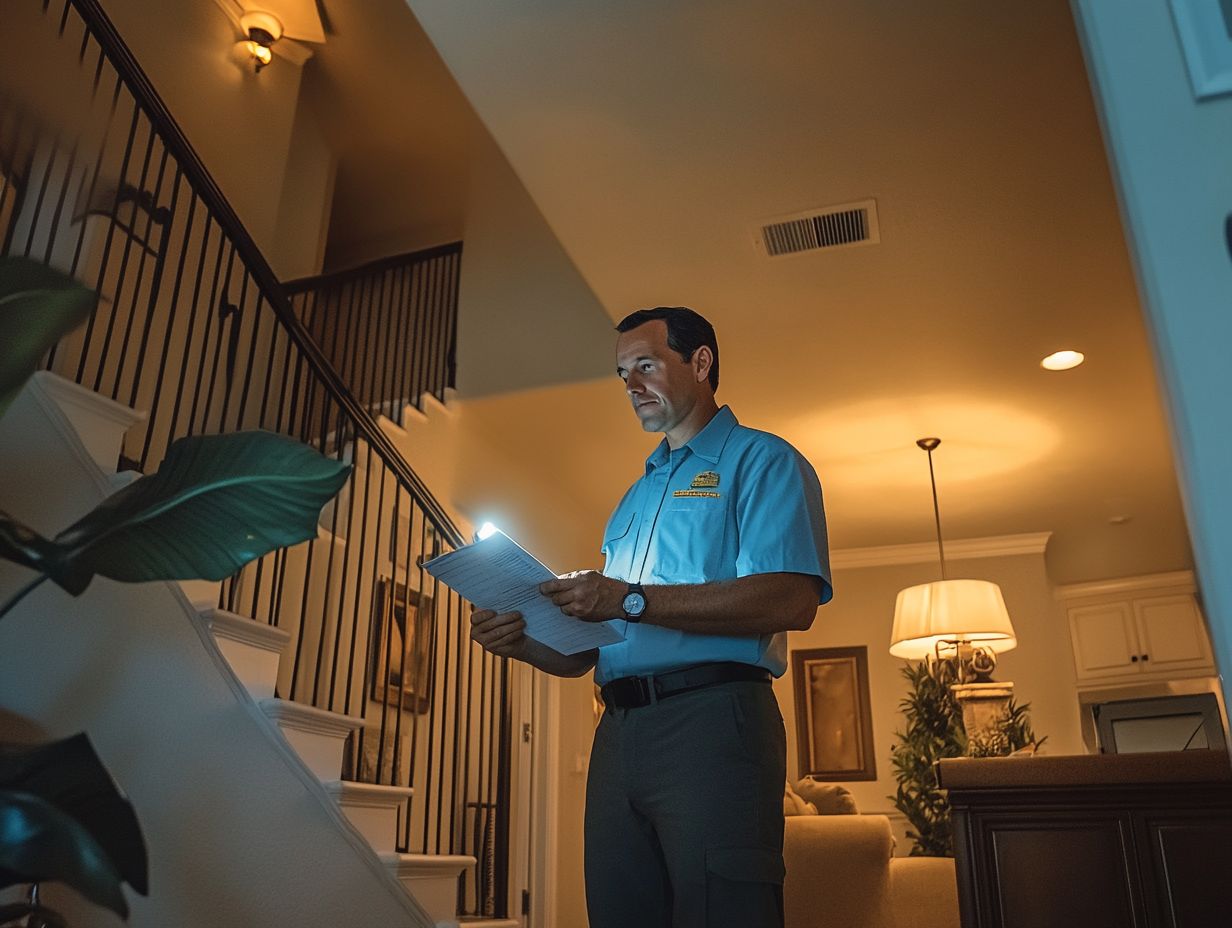
Home inspection fees are the cost associated with hiring a professional to assess the condition of a home. This typically includes a thorough examination of the home’s structure, systems, and overall condition.
How are home inspection fees determined?
Home inspection fees are typically determined by the size and age of the home, as well as the location and complexity of the inspection. For a deeper insight into these costs, check out resources on understanding home inspection fees and costs. Additional factors that can impact the cost include the type of inspection, such as a general inspection or specialized inspection for specific issues.
What is included in a typical home inspection?
A typical home inspection checks the home’s exterior and interior. It covers the roof, plumbing, electrical systems, heating, cooling, and extra features like fireplaces or pools.
The inspector also looks for safety hazards and code violations!
Are there extra fees for a home inspection?
Besides the standard inspection fee, additional charges may apply for specialized inspections like termite or mold checks. Some inspectors may also add travel expenses if the home is far from their base.
Is a home inspection really necessary?
Though not legally required, a home inspection is highly recommended for buyers and sellers. It provides essential information about the property’s condition, helping buyers make informed choices and allowing sellers to fix issues before listing.
Can you negotiate home inspection fees?
Yes, you can negotiate fees with the inspector! However, consider their experience and the thoroughness of the inspection when discussing the price.


